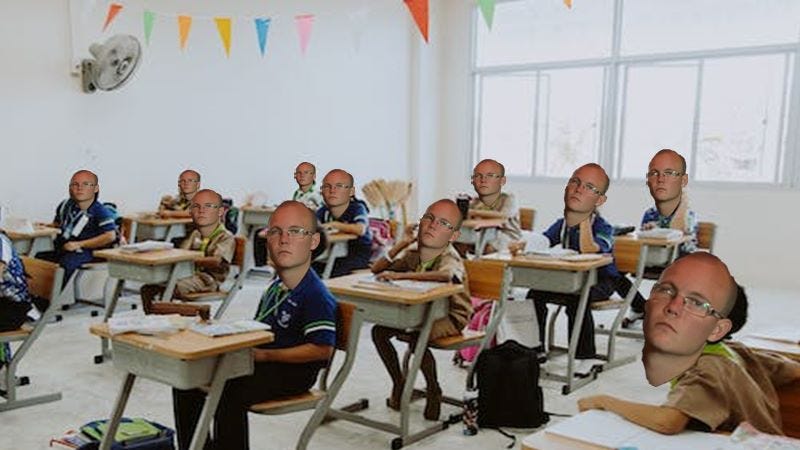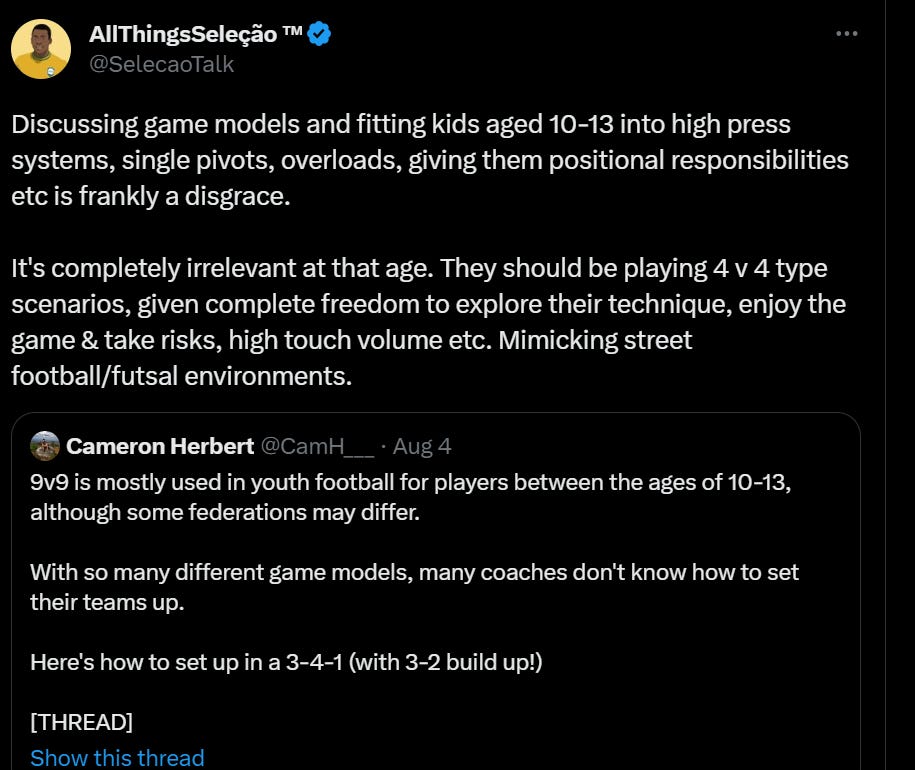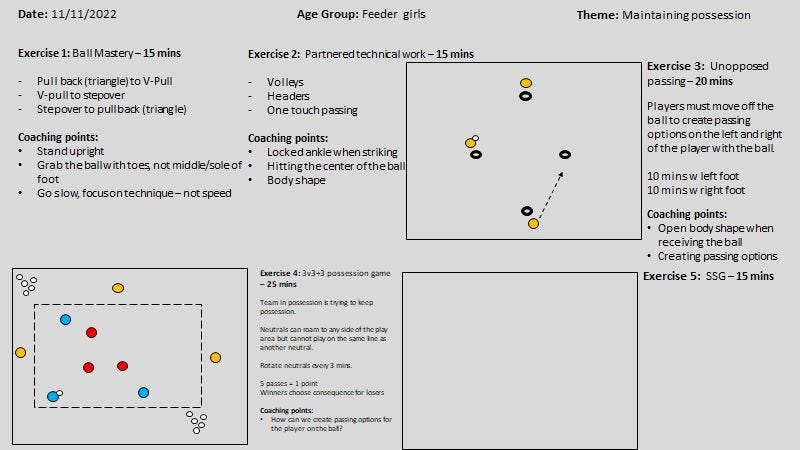Good morning! I want to talk about how important it is to have a curriculum for players to follow. I got some heat on Twitter recently for suggesting that 11 year old’s learn tactics…
So that inspired this weeks newsletter topic!
Before we start, please like this post by clicking the heart! If you do that then Substack will show more people The Weekly Rondo!
If you haven’t already, please subscribe!
Enjoy the newsletter!
Neat Reads
Neat Reads is a segment where I share an article or podcast that interests me and relates to our weekly theme.
Here’s an article I wrote: How to Develop Creative Players (I promise I’m taking that Medium page down soon, just not made enough time for it.)
You’ll find that you can add tactical elements to youth football very easily. For example, by playing players in different positions on the pitch or by making the game multi-directional, meaning that players have to rely on principles and ideas of play with their own technical ability.
Young people suck at soccer. Teach them.
To suggest that children should not be given any sort of guidance until “they’re ready” is just wrong. Young people can be told the rules of football but they can’t be taught to play without some help.
Some of the help we can give players comes in the form of curriculums catered to their age.
I wrote a piece on 9v9 soccer tactics and was told that kids just need to “learn themselves” and should just play.
No, they shouldn’t.
Players should play with their friends in a chaotic and comfortable environment, but if they come to a club or academy, we should offer some guidance.
What is your job as a coach if not to fix mistakes?
We can teach children basic tactical concepts such as what to do in 2v1s, 3v2s (pass or dribble, for example) without making it seem like it’s a military exercise. If you don’t know how to do that you should learn (ideally from me or someone better.)
When you break football down to it’s most basic components, it is simply answering simple overload situations. Qualitative, qualitative, etc. overloads and how to take advantage of them.
Please do not use these types of words on the training ground, 9 years old’s do not understand what a qualitative superiority is.
Why do we need a curriculum? Football is supposed to be fun!
Football can be fun and players can learn at the same time. These things depend on the coach. So, take some responsibility and make the curriculum fun.
Your personality, training exercises and relationships with players MATTER and will get them on board learning whatever it is the club or academy want to teach.
Every club has 20 clubs inside the club. That’s why we produce no players. - Someone in Canadian Soccer
If a club or academy has a style of play, or uses similar terminology throughout their development as they move through the age groups, those players will not have much to adapt to as they move up the age groups. Perhaps they just adjust to the size difference.
If a club or academy has coaches with different ideas for development and there’s inconsistency, the players will need to learn new vocabulary, new exercises, new ways of playing, and will be more overwhelmed.
Why would we want to overwhelm young people during the time of day where they’re meant to escape for their already quite overwhelming lives?
Coaches need to grow up. Follow a development plan or create one and follow on.
You wouldn’t go to the gym doing exercises you just “felt like doing” that day and expect to see results. Don’t treat youth development that way either.
Exercise of the Week
I worked with our U14 girls in Malawi. I created our curriculum knowing the context of the players we worked with:
Started playing football at 11-13
Never watched football, most came from villages with no TV
Very low level of education. Players struggled with problem solving, creativity, and initiative
Now, would you honestly just give them a ball and let them play until they figure it out? Or would you give them some ideas?
When you grow up without education or a poor level of education, how you learn from your mistakes is affected. To suggest that kids will just naturally learn is wrong. Very, very young kids won’t learn something is wrong until there’s a consequence like losing, being laughed at or yelled at by your peers.
As coaches, do we just let this happen or can we intervene and mitigate that embarrassment while also sharing ideas?
Curriculums need balance. That’s why I allot for about 60 minutes of uninterrupted play for my players every week.
This gives me the time to see if they learned what I taught them, while also just letting them be kids.
Conclusion
Thanks for reading this week! Please “like” this post by clicking the heart icon above. Substack will show this to more people if you like it, which means more paid members, which means more paid writers for this publication!
Once you’ve liked this, share this newsletter with a friend or every single person you have ever met.
See you next week!
Kindest,
Cameron







